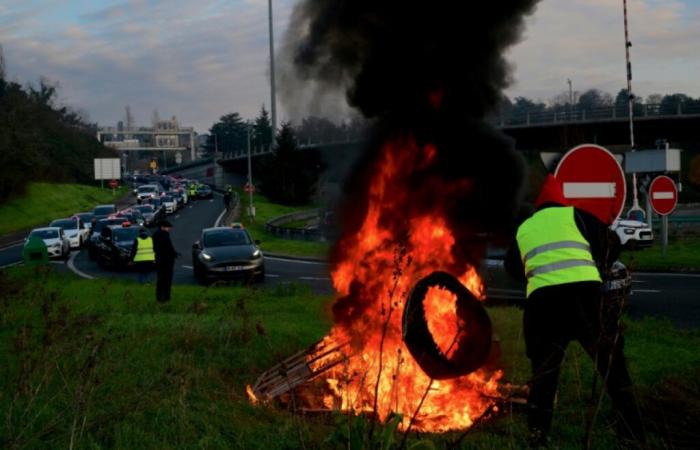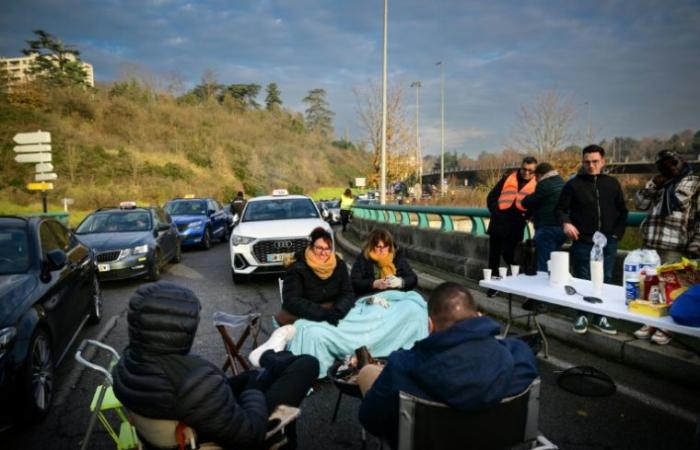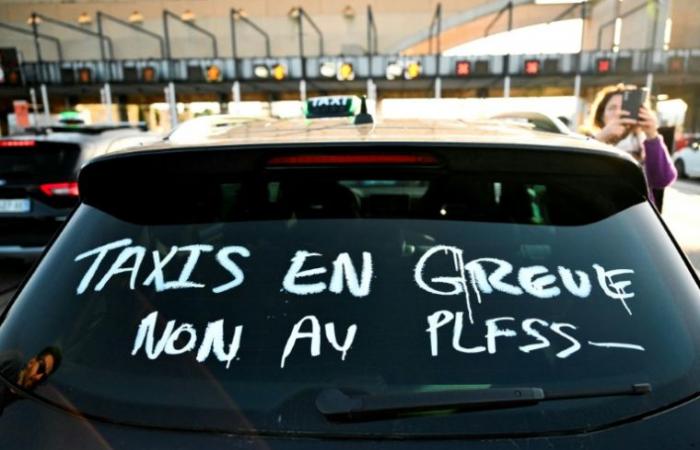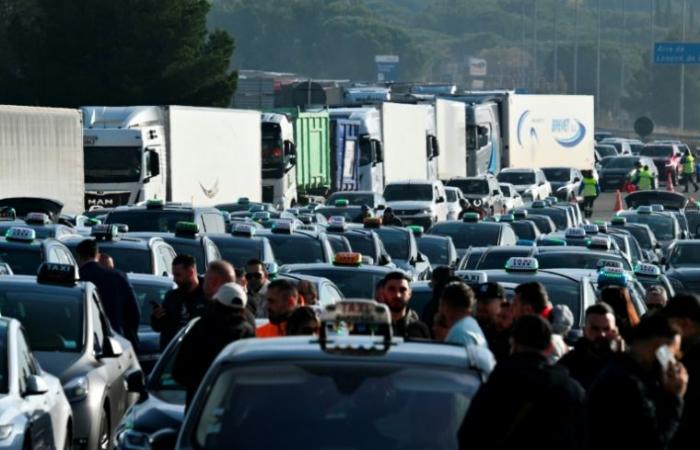Demonstration of taxi drivers in Lyon against the agreement currently being negotiated with Health Insurance for the transport of seated patients, December 2, 2024 (AFP / OLIVIER CHASSIGNOLE)
“We are trying to save our skin”: hundreds of taxi drivers disrupt traffic around Lyon and Toulon on Monday, to protest against an agreement currently being negotiated with Health Insurance including lower pricing for the transport of patients.
Hazard lights on, some 150 vehicles were already parked before dawn, in single files, on an interchange west of Lyon, without completely blocking traffic. “Taxis on strike”, “medical taxi in danger”, we could read on some.
Nicolas Galliot, 43, traveled from Clermont-Ferrand. At the head of a taxi company, medical transport represents 60 to 70% of his turnover. “But for country taxis, it can go up to 100%,” he specifies.
If this agreement is adopted, it will be “to the detriment of my employees, the value of our licenses, but above all patients,” he says.
In 2023, more than 40,000 taxis were approved to transport sick people suffering from pathologies ranging from cancer to psychiatric illnesses, according to Health Insurance, or almost three quarters of taxis in France.
In order to make 300 million euros in savings on this medical transport, the Barnier government now wishes to force taxis and medical transporters to negotiate measures with Health Insurance, under penalty of imposed price reductions.
In addition, a decree implementing the Social Security budget for 2024 provides that a patient can no longer refuse, with some exceptions, shared medical transport, under penalty of having to advance the costs and being reimbursed only on the basis shared transportation. Patients must also be treated in less than 45 minutes, and by geographic area with a kilometer detour limit per patient.
Taxi drivers take part in a road blocking demonstration on December 2, 2024 in Lyon (AFP / OLIVIER CHASSIGNOLE)
“Not only are we going to wait a very long time to fill the car, we are going to make endless rounds, but we are also going to deteriorate the service that we have put in place for years with patients,” explains to the 'AFP Abdel Green, president of the Federation of Independent Taxis of the Rhône (FTI69).
– Bivouac –
Coming from Puy-de-Dôme, Isère, Drôme, Loire and Haute-Loire, taxi drivers blocked lanes of the A7, A43 and A46 motorways, causing several dozen kilometers of traffic jams or slowdowns at the entrance to the Lyon metropolitan area.
The blockages should last until the end of the afternoon, the prefecture of the Auvergne-Rhône-Alpes region warned around 1 p.m.
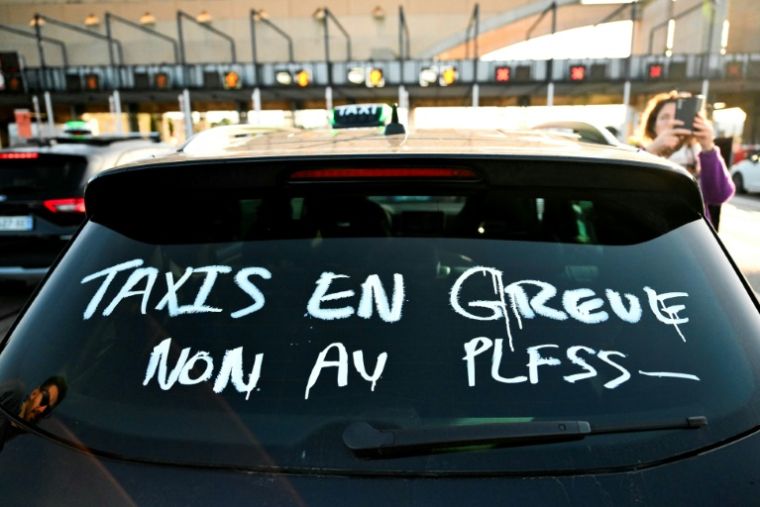
Demonstration of taxi drivers against the agreement currently being negotiated with Health Insurance for the transport of seated patients, on December 2, 2024 in Lançon-de-Provence, in Bouches-du-Rhône (AFP / Christophe SIMON)
In the heart of the city, in front of the Edouard Herriot hospital, around thirty of them parked and distributed leaflets, while warming up over a coffee.
In medical transport, “the approach is not the same as with a client who is picked up at the station”, underlines Mohammed, 36, sitting in his stationary vehicle and with almost 90% of his work is medical transportation.
“For most patients, during the journey, it's a kind of liberation. They don't feel sick when they're in the vehicle. It allows them to forget. They tell us their worries, we tell them ours “, he illustrates. “And with the new agreement, they will no longer have the choice of carrier,” he adds.
Sabrina Pena, 51, a taxi driver for 27 years in Lyon, carries out 10% of her activity with patients. She regrets the drop in prices because “for several years everything has increased, the price of fuel, vehicles, tolls, the price of bottled water for customers”. “They know that we are caught by the throat because we are all in debt,” she says in front of the Edouard Herriot hospital.
The taxi processions must converge towards the center of Lyon to reach Place Bellecour from 6:00 p.m., where they intend to bivouac for the night. Announcing “significant” disruptions, the prefecture invites road users to “anticipate their trips before this time or to favor other modes of travel”.
Disturbances in Provence-Alpes-Côte d'Azur were also noted, particularly at the entrances to downtown Toulon with a few kilometers of traffic jams, and the Toulon tunnel was closed, Vinci told AFP in the morning .
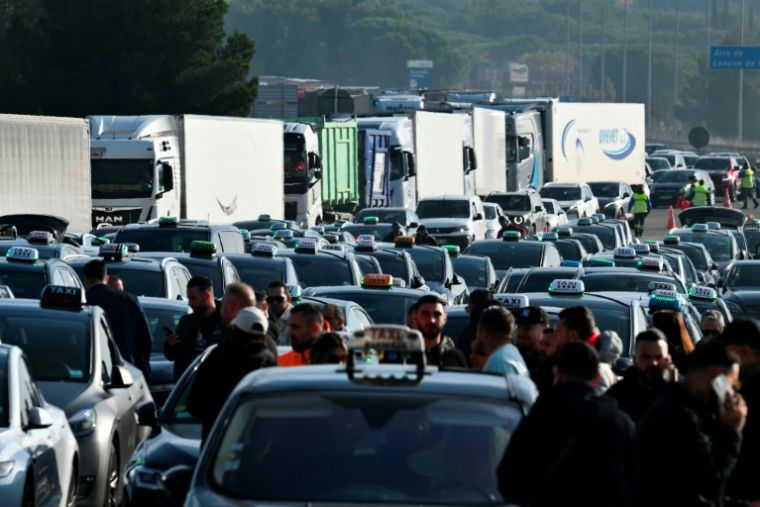
Taxi drivers block the toll of the A7 motorway in Lançon-de-Provence, December 2, 2024 in Bouches-du-Rhône (AFP / Christophe SIMON)
The Lançon-de-Provence toll, one of the most important on the A7 in Bouches-du-Rhône, is almost completely blocked, according to a journalist from AFP and Vinci.
Taxis from Marseille and the region blocked the payment lanes with their cars or tires. “Taxis sacrificed”, “no to the death of taxis”, we can read on banners or on windshields.
For Karine Lahouel, a taxi driver in Carpentras (Vaucluse) for eleven years, “we are trying to save our skin, very clearly, because this is the end, this is the last chance for this profession to continue to exist”, says this 52-year-old woman.

